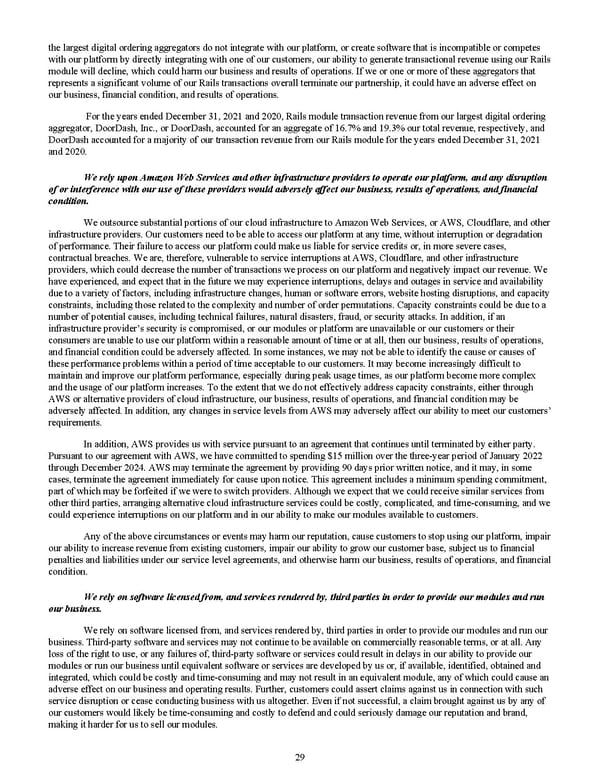the largest digital ordering aggregators do not integrate with our platform, or create software that is incompatible or competes with our platform by directly integrating with one of our customers, our ability to generate transactional revenue using our Rails module will decline, which could harm our business and results of operations. If we or one or more of these aggregators that represents a significant volume of our Rails transactions overall terminate our partnership, it could have an adverse effect on our business, financial condition, and results of operations. For the years ended December 31, 2021 and 2020, Rails module transaction revenue from our largest digital ordering aggregator, DoorDash, Inc., or DoorDash, accounted for an aggregate of 16.7% and 19.3% our total revenue, respectively, and DoorDash accounted for a majority of our transaction revenue from our Rails module for the years ended December 31, 2021 and 2020. We rely upon Amazon Web Services and other infrastructure providers to operate our platform, and any disruption of or interference with our use of these providers would adversely affect our business, results of operations, and financial condition. We outsource substantial portions of our cloud infrastructure to Amazon Web Services, or AWS, Cloudflare, and other infrastructure providers. Our customers need to be able to access our platform at any time, without interruption or degradation of performance. Their failure to access our platform could make us liable for service credits or, in more severe cases, contractual breaches. We are, therefore, vulnerable to service interruptions at AWS, Cloudflare, and other infrastructure providers, which could decrease the number of transactions we process on our platform and negatively impact our revenue. We have experienced, and expect that in the future we may experience interruptions, delays and outages in service and availability due to a variety of factors, including infrastructure changes, human or software errors, website hosting disruptions, and capacity constraints, including those related to the complexity and number of order permutations. Capacity constraints could be due to a number of potential causes, including technical failures, natural disasters, fraud, or security attacks. In addition, if an infrastructure provider’s security is compromised, or our modules or platform are unavailable or our customers or their consumers are unable to use our platform within a reasonable amount of time or at all, then our business, results of operations, and financial condition could be adversely affected. In some instances, we may not be able to identify the cause or causes of these performance problems within a period of time acceptable to our customers. It may become increasingly difficult to maintain and improve our platform performance, especially during peak usage times, as our platform become more complex and the usage of our platform increases. To the extent that we do not effectively address capacity constraints, either through AWS or alternative providers of cloud infrastructure, our business, results of operations, and financial condition may be adversely affected. In addition, any changes in service levels from AWS may adversely affect our ability to meet our customers’ requirements. In addition, AWS provides us with service pursuant to an agreement that continues until terminated by either party. Pursuant to our agreement with AWS, we have committed to spending $15 million over the three-year period of January 2022 through December 2024. AWS may terminate the agreement by providing 90 days prior written notice, and it may, in some cases, terminate the agreement immediately for cause upon notice. This agreement includes a minimum spending commitment, part of which may be forfeited if we were to switch providers. Although we expect that we could receive similar services from other third parties, arranging alternative cloud infrastructure services could be costly, complicated, and time-consuming, and we could experience interruptions on our platform and in our ability to make our modules available to customers. Any of the above circumstances or events may harm our reputation, cause customers to stop using our platform, impair our ability to increase revenue from existing customers, impair our ability to grow our customer base, subject us to financial penalties and liabilities under our service level agreements, and otherwise harm our business, results of operations, and financial condition. We rely on software licensed from, and services rendered by, third parties in order to provide our modules and run our business. We rely on software licensed from, and services rendered by, third parties in order to provide our modules and run our business. Third-party software and services may not continue to be available on commercially reasonable terms, or at all. Any loss of the right to use, or any failures of, third-party software or services could result in delays in our ability to provide our modules or run our business until equivalent software or services are developed by us or, if available, identified, obtained and integrated, which could be costly and time-consuming and may not result in an equivalent module, any of which could cause an adverse effect on our business and operating results. Further, customers could assert claims against us in connection with such service disruption or cease conducting business with us altogether. Even if not successful, a claim brought against us by any of our customers would likely be time-consuming and costly to defend and could seriously damage our reputation and brand, making it harder for us to sell our modules. 29
 2022 10K Page 35 Page 37
2022 10K Page 35 Page 37